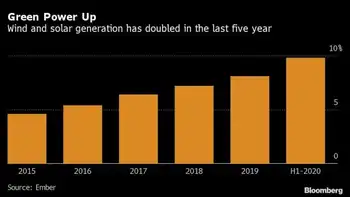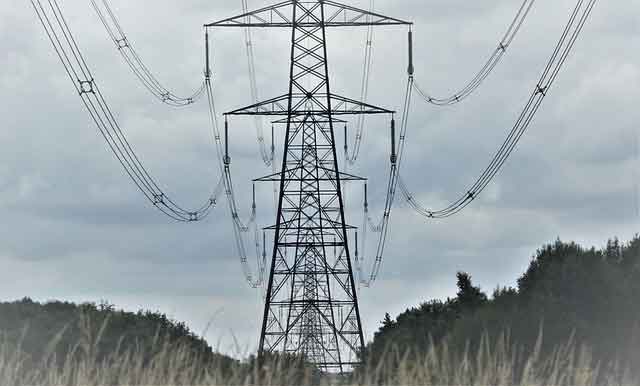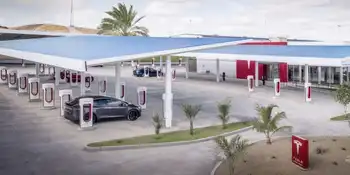Texas Electric Cooperatives outperformed during Winter Storm Uri, with higher customer satisfaction, equitable rolling blackouts, and stronger grid reliability compared to deregulated markets, according to ERCOT-area survey data of regulated utilities and commercial providers.
Key Points
Member-owned utilities in Texas delivering power, noted for reliability and fair outages during Winter Storm Uri.
✅ Member-owned, regulated utilities serving local communities
✅ Rated higher for blackout management and communication
✅ Operate outside deregulated markets; align incentives with users
Winter Storm Uri began to hit parts of Texas on February 13, 2021 and its onslaught left close to 4.5 million Texas homes and businesses without power, and many faced power and water disruptions at its peak. By some accounts, the preliminary number of deaths attributed to the storm is nearly 200, and the economic toll for the Lone Star State is estimated to be as high as $295 billion.
The more than two-thirds of Texans who lost power during this devastating storm were notably more negative than positive in their evaluation of the performance of their local electric utility, mirrored by a rise in electricity complaints statewide, with one exception. That exception are the members of the more than 60 electric cooperatives operating within the Texas Interconnection electrical grid, which, in sharp contrast to the customers of the commercial utilities that provide power to the majority of Texans, gave their local utility a positive evaluation related to its performance during the storm.
In order to study Winter Storm Uri’s impact on Texas, the Hobby School of Public Affairs at the University of Houston conducted an online survey during the first half of March of residents 18 and older who live in the 213 counties (91.5% of the state population) served by the Texas power grid, which is managed by the Electric Reliability Council of Texas (ERCOT).
Three-quarters of the survey population (75%) live in areas with a deregulated utility market, where a specified transmission and delivery utility by region is responsible for delivering the electricity (purchased from one of a myriad of private companies by the consumer) to homes and businesses. The four main utility providers are Oncor, CenterPoint CNP -2.2%, American Electric Power (AEP) North, and American Electric Power (AEP) Central.
The other 25% of the survey population live in areas with regulated markets, where a single company is responsible for both delivering the electricity to homes and businesses and serves as the only source from which electricity is purchased. Municipal-owned and operated utilities (e.g., Austin Energy, Bryan Texas Utilities, Burnet Electric Department, Denton Municipal Electric, New Braunfels Utilities, San Antonio’s CPS Energy CMS -2.1%) serve 73% of the regulated market. Electric cooperatives (e.g., Bluebonnet Electric Cooperative, Central Texas Electric Cooperative, Guadalupe Valley Cooperative, Lamb County Electric Cooperative, Pedernales Electricity Cooperative, Wood County Electric Cooperative) serve one-fifth of this market (21%), with private companies accounting for 6% of the regulated market.
The overall distribution of the survey population by electric utility providers is: Oncor (38%), CenterPoint (21%), municipal-owned utilities (18%), AEP Central & AEP North combined (12%), electric cooperatives (6%), other providers in the deregulated market (4%) and other providers in the regulated market (1%).
There were no noteworthy differences among the 31% of Texans who did not lose power during the winter storm in regard to their evaluations of their local electricity provider or their belief that the power cuts in their locale were carried out in an equitable manner.
However, among the 69% of Texans who lost power, those served by electric cooperatives in the regulated market and those served by private electric utilities in the deregulated market differed notably regarding their evaluation of the performance of their local electric utility, both in regard to their management of the rolling blackouts, amid debates over market reforms to avoid blackouts, and to their overall performance during the winter storm. Those Texans who lost power and are served by electric cooperatives in a regulated market had a significantly more positive evaluation of the performance of their local electric utility than did those Texans who lost power and are served by a private company in a deregulated electricity market.
For example, only 24% of Texans served by electric cooperatives had a negative evaluation of their local electric utility’s overall performance during the winter storm, compared to 55%, 56% and 61% of those served by AEP, Oncor and CenterPoint respectively. A slightly smaller proportion of Texans served by electric cooperatives (22%) had a negative evaluation of their local electric utility’s performance managing the rolling blackouts during the winter storm, compared to 58%, 61% and 71% of Texans served by Oncor, AEP and CenterPoint, respectively.
Texans served by electric cooperatives in regulated markets were more likely to agree that the power cuts in their local area were carried out in an equitable manner compared to Texans served by commercial electricity utilities in deregulated markets. More than half (52%) of those served by an electric cooperative agreed that power cuts during the winter storm in their area were carried out in an equitable manner, compared to only 26%, 23% and 23% of those served by Oncor, AEP and CenterPoint respectively
The survey data did not allow us to provide a conclusive explanation as to why the performance during the winter storm by electric cooperatives (and to a much lesser extent municipal utilities) in the regulated markets was viewed more favorably by their customers than was the performance of the private companies in the deregulated markets viewed by their customers. Yet here are three, far from exhaustive, possible explanations.
First, electric cooperatives might have performed better (based on objective empirical metrics) during the winter storm, perhaps because they are more committed to their customers, who are effectively their bosses. .
Second, members of electric cooperatives may believe their electric utility prioritizes their interests more than do customers of commercial electric utilities and therefore, even if equal empirical performance were the case, are more likely to rate their electric utility in a positive manner than are customers of commercial utilities.
Third, regulated electric utilities where a single entity is responsible for the commercialization, transmission and distribution of electricity might be better able to respond to the type of challenges presented by the February 2021 winter storm than are deregulated electric utilities where one entity is responsible for commercialization and another is responsible for transmission and distribution, aligning with calls to improve electricity reliability across Texas.
Other explanations for these findings may exist, which in addition to the three posited above, await future empirical verification via new and more comprehensive studies designed specifically to study electric cooperatives, large commercial utilities, and the incentives that these entities face under the regulatory system governing production, commercialization and distribution of electricity, including rulings that some plants are exempt from providing electricity in emergencies under state law.
Still, opinion about electricity providers during Winter Storm Uri is clear: Texans served by regulated electricity markets, especially by electric cooperatives, were much more satisfied with their providers’ performance than were those in deregulated markets. Throughout its history, Texas has staunchly supported the free market. Could Winter Storm Uri change this propensity, or will attempts to regulate electricity lessen as the memories of the storm’s havoc fades? With a hotter summer predicted to be on the horizon in 2021 and growing awareness of severe heat blackout risks, we may soon get an answer.
Related News












